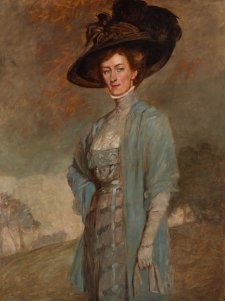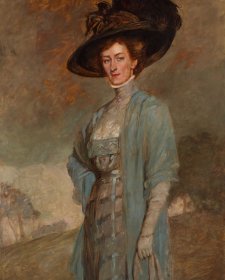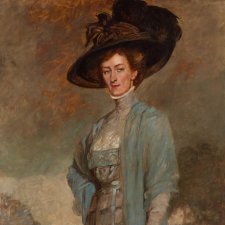- About us
- Support the Gallery
- Venue hire
- Publications
- Research library
- Organisation chart
- Employment
- Contact us
- Make a booking
- Onsite programs
- Online programs
- School visit information
- Learning resources
- Little Darlings
- Professional learning
Ada Jemima Crossley (1874–1929), singer, was one of several Australian-born divas to achieve an international reputation in the late nineteenth century. Raised in the tiny South Gippsland settlement of Tarraville, Crossley once described herself as 'a regular rough bush youngster', and is said to have known the rudiments of music before she could read. 'The piano was my world then, and I stuck to it most religiously'. At age fourteen, conductor Sir Frederick Cowen declared her to have a beautiful, pure voice that was at risk of being ruined without adequate training. She was sent to Melbourne for professional coaching with Madame Fanny Simonsen and was eighteen when she appeared in her first official engagement in a concert at the Melbourne Town Hall. Over the next several years she established her reputation for oratorio with appearances in Melbourne and Sydney. 'In the opinion of good judges', stated the newspaper Table Talk in 1894, 'Australia has not produced a better singer. With the Sydney people she is a great favourite, and she deserves to be, for she has a magnificent voice, whilst her physical attractions are more than ordinary.' She left for Europe in 1894, studying with Sir Charles Santley in London and then in Paris with Melba's teacher, Madame Mathilde Marchesi, who considered her one of her best pupils. She made her London debut in May 1895 and was soon singing in festivals throughout Britain.
Crossley became known for her 'dignity, fine poise and style' as well as the 'luscious richness' of her voice and was commanded five times to sing for Queen Victoria. Audiences appreciated her generosity in giving encores, often referring to her as 'Ada of the Voice'. She made a successful tour of the United States in 1902 and was then engaged by JC Williamson to visit Australia and New Zealand. Percy Grainger was among her entourage when she arrived home in September 1903 and he accompanied her again on her second Australian tour in 1908. Grainger recalled Crossley as possessing 'a glorious voice and rare interpretive gifts in every style of music that she essayed', and as a performer who aroused 'frenetic enthusiasm' whenever she sang. The 'charming' St John's Wood home she established with her husband, Dr Francis Muecke – an Adelaide-born ear nose and throat specialist whom she met when returning to England by ship in 1904 – was said to have 'a delightful garden full of Australian flowers, among which the bottlebrush blooms finely.' 'Always a true Australian', she was renowned for the hospitality and support she showed to Australian singers newly arrived in London, and 'during the war, her home was always open in welcome to any Australian soldiers'. Crossley retired from professional engagements in 1913 but continued to sing at charity concerts.
Purchased 2022



On one level The Companion talks about the most famous and frontline Australians, but on another it tells us about ourselves.



Spanning the 1880s to the 1930s, this collection display celebrates the innovations in art – and life – introduced by the generation of Australians who travelled to London and Paris for experience and inspiration in the decades either side of 1900.



Visit us, learn with us, support us or work with us! Here’s a range of information about planning your visit, our history and more!